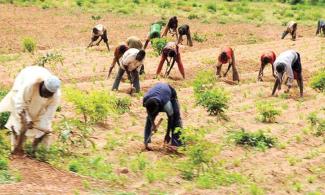
This hostile situation was what dissuaded many locals from farming, leading to a shortage of food items in Nigeria’s markets nationwide.
A report has explained how local farmers in Northern Nigeria pay as much as N100,000 to bandits and terrorists to access their farmland during the planting or harvest season.
The details of this are contained in a recent report done by SB Morgen Intelligence, alleging that any farmer who fails to comply may be killed, abducted or made to forfeit his farm produce.
The report said bandits in some communities in Kaduna State forced farmers to pay between N70,000 and N100,000 for permission to farm.
The report stated, “In Kaduna, communities like Kidandan, Galadimawa Kerawa, Sabon Layi, Sabon Birni and Ruma have been significantly impacted.
“Residents in these areas have reported paying substantial sums ranging from N70,000 to N100,000 to bandits for permission to farm, with additional payments required for harvesting. Those who resist these demands face severe consequences, including abduction, murder or confiscation of their produce.”
Payments to bandits in Zamfara State vary depending on the crop grown, with farmers paying more for more expensive crops. According to the survey, rice farmers in some LGAs paid almost N120,000 in farm levies to robbers, whereas Guinea maize producers were only required to pay N50,000.
The report equally highlighted that payments to bandits might be made in cash or with harvest revenues, as levies are typically greater during the harvest season.
The report said bandits also practised tacit slavery by compelling villages to raise and sell crops for them.
Between November 2020 and November 2023, farmers in the North-west states were taxed around N224.92 million by various bandits operating in the region. Many victims have been abducted and, in some cases, killed, forcing them to escape their homes.
This hostile situation was what dissuaded many locals from farming, leading to a shortage of food items in Nigeria’s markets nationwide.